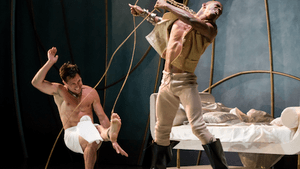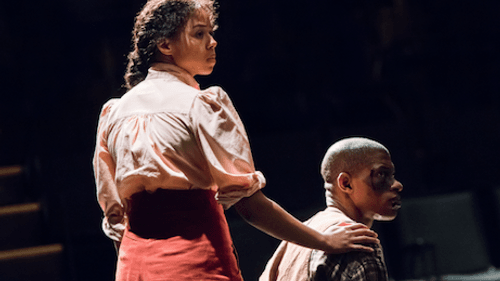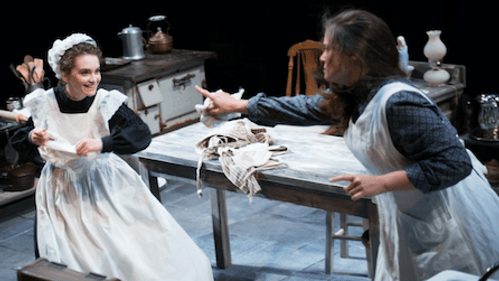Stay in the Loop
BSR publishes on a weekly schedule, with an email newsletter every Wednesday and Thursday morning. There’s no paywall, and subscribing is always free.
Road tripping: Five new American plays in one unexpected place
Contemporary American Theater Festival's 26th season

My fourth consecutive trip to the tiny college town of Shepherdstown, West Virginia for the Contemporary American Theater Festival (CATF) proved as worthwhile as the first three. As a summer vacation destination, it's an easy three-hour drive from Philadelphia to a pleasant and affordable town with many other attractions. As a summer theater trip, CATF features new American plays — five, that can be seen in just two days — with the core values of "fearless art; daring and diverse stories; a profound dynamic among the audience, the artist, and the work." The company's 26th season certainly fulfills these, in some productions more than others.
The Wedding Gift: Fun, but safe
I like that Artistic Director Ed Herendeen is open to science fiction plays (CATF produced Philadelphia playwright Thomas Gibbons's Uncanny Valley in 2014), so I was especially intrigued by Chisa Hutchinson's The Wedding Gift, a very different work from her 2014 tearjerker Dead and Breathing. A play set in "a far off place, so far in the future, it's stupid," The Wedding Gift conjures an alien culture complete with trippy set on the spacious Frank Theater stage (David M. Barber), wild clothing (Peggy McKowen), funky music (Nathan A. Roberts and Charles Coes), and Hutchinson's invented language.
Black actors play all the roles, except for the title character, Doug, a white man apparently from our time (and New Jersey), chained in a big birdcage. Bride Nahlis (Margaret Ivey, who appeared in several recent People's Light shows) likes her new plaything, but groom Beshrum (Damian Thompson), a bully, is not amused by Doug's belligerent desire to escape. Our understanding of this society's ways grows as Doug's does, helped by a sympathetic servant (Nafeesa Monroe) who knows a little bit of his — and our — language. A pet psychiatrist (Edward O'Blenis) also hilariously bridges the gap.
Director May Adrales' inventive, fun production kept me engaged on several levels: not only the humor and mystery of a human coping with captivity in an alien society, but hints of larger themes about how we view others who are different. There are parallels, of course, to modern American racial divides, but the play let me down with a simple science fiction explanation for how Doug got here, and didn’t say much more.
pen/man/ship [sic]: An important play for today
What The Wedding Gift doesn't do — meaningfully relate to today — Christina Anderson's pen/man/ship does brilliantly and fearlessly. Set on a former whaling ship in 1896, her four-person drama — like her 2014 CATF success, The Ashes Under Gait City — takes on important contemporary racial issues from a unique angle. For me, the play's impact was amplified by its timing, opening the week of two fatal shootings of black men by police and five officers'a deaths in Dallas. But this play has scope and power beyond any single week's news.
A black surveyor, Charles (Brian D. Coats), hires a ship to sail from New York City to Liberia. His estranged son Jacob (Damian Thompson) works with him, but brings a friend, Ruby (Margaret Ivey). Sparks fly when Charles questions Ruby's obedience to God and men, Ruby answers defiantly, and Jacob tries to mediate. Charles, an alcoholic, sequesters himself from the crew, whom he considers beneath him socially, and surprising events pit them against him. Charles and Ruby struggle for control of the men and the ship, but fight for much more than that.
Lucie Tiberghien's production features Kris Stone's fascinating set in the Marinoff Theater, a black box usually configured with audience on four sides of a rectangular playing area. Dark wood decking surrounds a pool of water, only two inches deep, where the action, nearly all of it in Charles's cabin, occurs. At first, this puzzled me: the Atlantic Ocean is outside the ship, not inside. The pool requires the cast to perform barefoot, and affects all movement; walking across the room becomes sloshy, and faster movement results in much splashing and uncertain footing. I grew to appreciate it, however, for the constant sounds of water and this unusual yet very natural resistance the characters face. My thoughts caught up to the feeling, and I realized that water inside a ship is a very serious situation. Along with a sail flying above the stage, the set adds an undercurrent of danger to a skillfully crafted drama about freedom, equality, religion, sexuality, and more.

Not Medea: A close second
I don't want to make a game of ranking the plays, but one other felt very strong and polished: Allison Gregory's Not Medea, the one play produced this season in CATF's smaller black box theater, set up with audience on four sides. Joey Parsons brilliantly plays a frenetic woman arriving just before the performance starts, provoking many laughs with her awkward attempts to seat and organize herself. Of course, we all know she's in the play, but Gregory and director Courtney Sale build the shtick so convincingly that she, and we, slip gracefully into the classic story of the spurned woman who kills her children.
Gregory takes big risks, starting Not Medea as a comedy about an overworked single mom escaping for a night of theater; she never manages to turn off her phone while heading inevitably into that darker story. It reminded me a little of Ann-Marie MacDonald's Goodnight Desdemona (Good Morning Juliet), which sends an academic into two Shakespeare tragedies. But that protagonist turns both plays into comedies. Here, our hapless heroine knows where the play is headed. In college, she "drank the Greek mythology Kool-Aid.” What we don't yet know is why she's irresistibly drawn into the story. Both Medea's tale and the woman's are compelling and surprising, as well as deftly woven together.
CATF's design work is always ambitious and skillful, and Not Medea shows this as well as pen/man/ship. Coincidentally, both have a pool on stage, but Jesse Dreikosen's polished wooden platform, with its luxurious bed, modern furniture, and magical pond, all superbly lit by John Ambrosone, looks small but feels huge when the stories expand to mythic dimensions.
The Second Girl: Engaging, with or without footnotes
Ronan Noone's The Second Girl spins a drama amongst James Tyrone's unhappy servants in 1912. If one knows Eugene O'Neill's autobiographical play Long Day's Journey into Night, then Roone's mentions of Tyrone, wife Mary, and sons Jamie and Edmund — as well as indistinct dialogue from another room — indicate that O'Neill's 1940 masterpiece is occurring offstage. I love such connections; Jamie is also a central character in O'Neill's A Moon for the Misbegotten.
However, one needn't know Night to appreciate The Second Girl. Cathleen (Cathryn Wake), actually a small character in O'Neill's play, is the title character, a young Irish immigrant being tutored by Bridget (Jessica Wortham), who is 40 and nearing spinsterhood unless something blossoms between her and chauffeur Jack (Ted Koch). Cathleen flirts with the idea of becoming an actress, but also plans to return to her fiancé in Ireland. Bridget has turned to drink. Jack might be what both of them need.
Their tribulations play in nine scenes spread over 24 hours and the women's busy preparation of breakfast, lunch, dinner, and breakfast again for their masters. Kris Stone transforms the Marinoff space, which seems so vast for pen/man/ship, into a cramped, hot working kitchen. A clock constantly ticks, though we only notice in silent moments; it's a reminder both of the work that runs their lives, and the time slipping away. Intense performances make Ed Herendeen's production succeed.

20th Century Blues: So last century
Susan Miller is this season's most accomplished CATF playwright, but the author of the autobiographical drama My Left Breast contributes the only script that doesn't measure up to their lofty mission. Four women, friends since college, reunite once a year for a photo shoot by photographer and central character Danny (Betsy Aidem). It's great to see four female characters in their sixties, but they seem created by committee for a lazy sitcom-level diversity: Mac (Franchelle Stewart Dorn) is both black and gay, Sil (Alexandra Neil) is an uptight realtor worried about aging, and Gabby (Kathryn Grody) is a veterinarian. Danny wants to display the accumulated photo evidence of their aging, but some of the women are reluctant to expose themselves.
Through lots of chatty exposition — their lives are rehashed in tidy quippy detail — and a frenetic dance party that feels cut from a Lifetime movie, 20th Century Blues mainly looks backwards, since it lacks a compelling forward-moving story. Many tales are told, including Danny's play-wrapping TED talk, but the photo decision generates no suspense and little interest, and the actual photos, a few of which are projected at the play's end, are embarrassingly photoshopped.
Other observations
CATF is committed to diversity: Two of CATF '16's five playwrights are black (Anderson and Hutchinson), and four are women. They're a variety of ages (sometimes, "new" plays are mainly from young playwrights). While the plays and productions have some intriguing connections, they don't feel chosen by one person (though they are). They range over times, cultures, and styles, joined together primarily by being by, and about, Americans. I can't wait to see what CATF discovers for next year. Will I like them all? Probably not. But the company's efforts are consistently admirable.
What, When, Where
Contemporary American Theater Festival. pen/man/ship, by Christina Anderson. Not Medea, by Allison Gregory. The Wedding Gift, by Chisa Hutchinson. 20th Century Blues, by Susan Miller. The Second Girl, by Ronan Noone. July 8-31, 2016 at Shepherd University, Shepherdstown, West Virginia. (800) 999-CATF, or catf.org.
Sign up for our newsletter
All of the week's new articles, all in one place. Sign up for the free weekly BSR newsletters, and don't miss a conversation.

 Mark Cofta
Mark Cofta